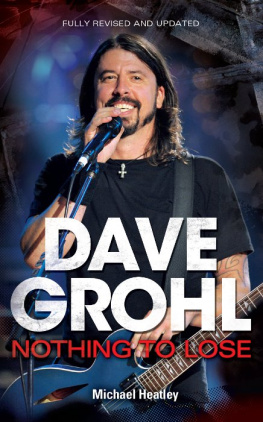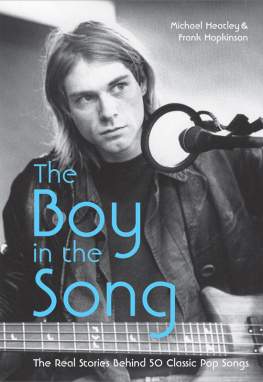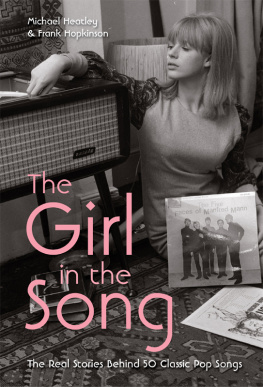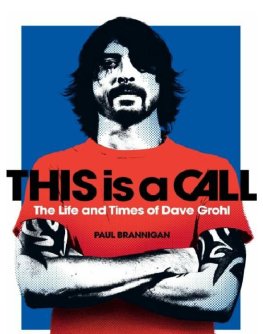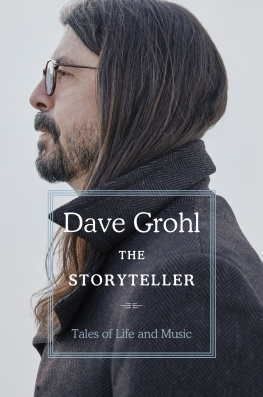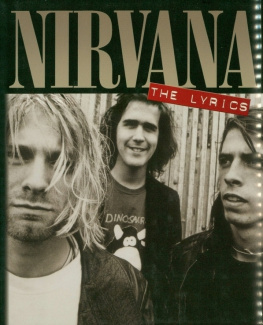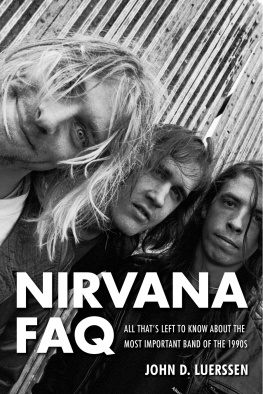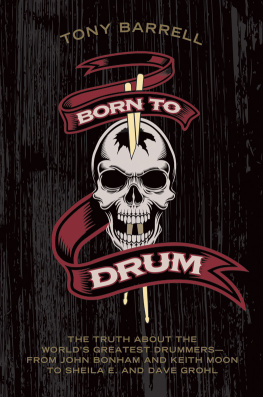
DAVE
GROHL
NOTHING TO LOSE
Michael Heatley
TITAN BOOKS
Dave Grohl: Nothing to Lose
ISBN: 9780857687210
Published by
Titan Books
A division of Titan Publishing Group Ltd.
144 Southwark St.
London
SE1 0UP
This edition: September 2011
10 9 8 7 6 5 4 3 2 1
First published in the UK 2006.
Dave Grohl: Nothing to Lose copyright Michael Heatley 2006, 2010, 2011.
Designed by Peri Godbold.
Did you enjoy this book? We love to hear from our readers. Please e-mail us at: or write to Reader Feedback at the above address.
To receive advance information, news, competitions, and exclusive offers online, please sign up for the Titan newsletter on our website:
www.titanbooks.com
No part of this publication may be reproduced, stored in a retrieval system, or transmitted, in any form or by any means without the prior written permission of the publisher, nor be otherwise circulated in any form of binding or cover other than that in which it is published and without a similar condition being imposed on the subsequent purchaser.
A CIP catalogue record for this title is available from the British Library.
Printed and bound in the United States of America.
Picture Credits
Front cover: John Shearer/Getty Images
Back cover: Nitu Mistry/Rex Features
Picture Section 1
Page 1: Everett Collection/Rex Features
Page 2: Fotos International/Rex Features (top), Sipa Press/Rex Features (bottom)
Page 3: Andr Csillag/Rex Features
Page 4: Stephen Sweet/Rex Features
Page 5: Andr Csillag/Rex Features
Page 6: Erik Pendzich/Rex Features
Page 7: Andr Csillag/Rex Features (top), Rex Features (bottom)
Page 8: Stephen Meddle/Rex Features
Picture Section 2
Page 1: Crawford Brown/Rex Features
Page 2: Mick Hutson/Redferns
Page 3: Brian Rasic/Rex Features (both)
Page 4: AUTIO/Rex Features
Page 5: Alfredo Rocha/Rex Features (top), Nigel Crane/Redferns (bottom)
Page 6: Kadzen/Rex Features
Page 7: Action Press/Rex Features (top), John Alex Maguire/Rex Features, KPA/Zuma/Rex Features (bottom right)
Page 8: Stefan M Prager/Redferns/Getty Images
INTRODUCTION
S inging drummers... Well, theres Phil Collins, Ringo Starr, Don Henley, Roger Taylor and, er thats more or less your lot. It would have taken a seer of Petulengro-esque proportions to predict that the long-haired sticksman thrashing away at the back of Kurt Cobain as Nirvana blasted forth their era-defining grunge anthems would add to that nuvilarly configured if slightly less hirsute Animal of The Muppets might have seemed a better bet...
Dave Grohl has confounded stereotypes and exceeded expectations to emerge as frontman with Foo Fighters, a band that started off as a solo studio project yet has become perhaps the first supergroup of the current millennium. Its a band whose popularity is inextricably bound up with Grohl himself indeed, until the recruitment of former Alanis Morissette drummer Taylor Hawkins some two albums in, few but the committed could have named you another member of the outfit.
Foo Fighters were christened after the nickname given to mysterious silver balls of light seen by both the Allies and the Germans over the Rhine in December 1944 and, though officially explained as electrical phenomena, believed by pilots to be of extraterrestrial origin. In similar fashion, Grohl named his record label Roswell after the town in New Mexico where, legend has it, a UFO crash-landed in 1947 and where evidence of the unidentified visitors is still stored in top-secret conditions. After using a flying saucer on the cover of Foo Fighters debut single and a space-age ray-gun on the first album sleeve, Dave was later to play down the UFO connections.
Google the name Grohl and youll find over 1.6 million references. And while not all of them are attributable to our man, there arent that many alternatives. Not bad for a drummer. Yet drums were always a means to an end for a man whose first instrument was the guitar. And since starting Foo Fighters, drums have proved his passport to freedom when the pressures have been too great. He will always be in demand as the worlds highest-profile session drummer, and theres little doubt that, should Led Zeppelin ever decide to take one final live bow, their former teenage fan from Springfield, Virginia would be their first choice to take the place of the late, great John Bonham.
Of course, its Daves brief spell in Nirvana that guarantees him a place in rock history even if, at the time of writing, hes spent more than three times as long with Foo Fighters. The band once claimed by their leader Kurt Cobain to be musically and rhythmically retarded showed that, as with the first punk wave, rock music had to take a step back to move forwards. And it remains the fact that, since the release of the seminal Nevermind album in 1991, bands and albums have regularly been classified as pre- or post-Nirvana.
If Grohl has learned one thing from the Nirvana experience, it is this: engage with the media, but set the boundaries at the outset. This nice guy tactic has enabled him to weather a divorce with surprisingly little fallout, and has kept his name off the front pages of the tabloids in more cases than most. Privacy is priceless in this day and age of internet and rolling news TV, and his way of dealing with the media has been an object lesson honed, without doubt, from first-hand observation of his former band mates trials and tribulations.
Its certain that Dave Grohl has surfed to success on a wave of public approval. Hes everyones big brother, best friend, whatever. Foo Fighters videos have displayed a choice sense of humour that has undoubtedly played a major part in converting the uncommitted, and there seems no reason that their current 11-year record of success cannot be substantially extended in the future.
In an era of increasing categorisation, Foo Fighters have proved adept in keeping their feet in several musical camps. Their videos ensure heavy rotation on MTV, VH1 and other, perhaps poppier cable television channels, while the Nirvana connection ensures they will never be ignored by the heavy metal fraternity. And the singles appear to have enough hooks to capture the ear of radio programmers even those of Britains dance-obsessed Radio 1. One corollary of this has been the Foos ability to sweep up Grammy awards without being regarded as having sold out. Instead, theres a knowing wink as if to suggest that they have somehow subverted the established order the band that cleans up yet retains credibility.
A special relationship has been forged with the United Kingdom thanks to certain sympathetic characters like Radio 1s Steve Lamacq and Jo Whiley and journalist Everett True. The country also hosted several landmark Nirvana gigs, so Dave has always enjoyed playing to his British admirers. And a summer 2006 gig in Hyde Park to 60,000 fans should cement their position as one of the countrys top live draws, following in the footsteps of Roger Waters and the Who.
In 2005, New Musical Express asked Grohl, relaxed and happy in his 606 Studio in Northridge, California, whether he was most proud of his achievements with Foo Fighters or Nirvana. Coming from the man who once said, At the end of the day, will I always be remembered as the guy who played drums in Nirvana, no matter what I do after the fact?, the answer was predictable, the reasoning fascinating. Definitely the Foo Fighters, he told writer Ian Winwood, because its so much more personal to me. When I think of Nirvana its such a blur. You have to remember that I was only in that band for three and a half years and all that stuff happened in such a short space of time. It doesnt even seem like reality to me a lot of the time that and the fact I was their sixth drummer... But this thing is a labour of love.
Next page
